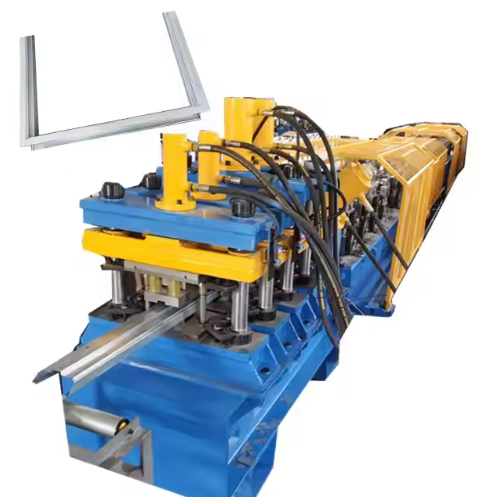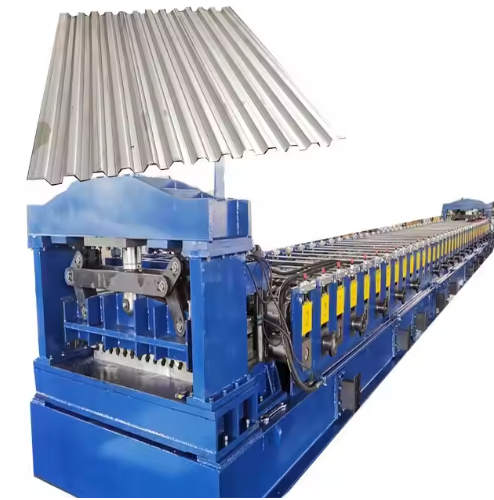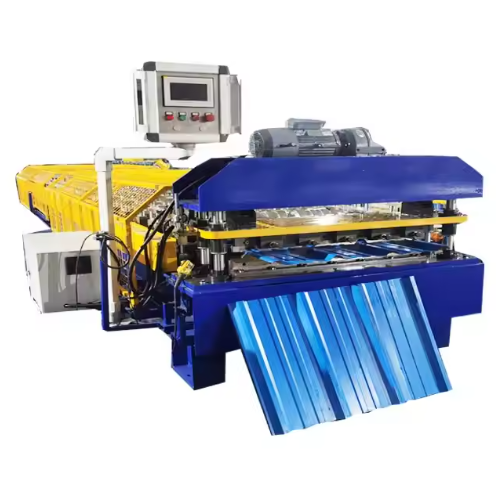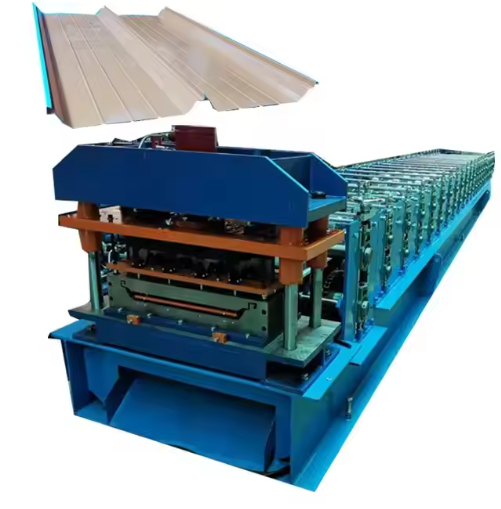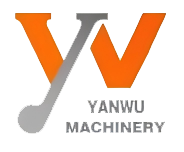Other Roll Forming Machines: Custom Solutions for Unique Manufacturing Needs
Understanding Custom Roll Forming Solutions
Roll forming is a manufacturing process that involves the continuous bending of a long strip of metal into a desired cross-sectional profile. This technique uses a series of roll stands that incrementally shape the metal, offering a precise and efficient method for producing uniform shapes from flat metal coils or strips. This method is pivotal in creating various structural components used across multiple industries.
Custom roll forming offers several advantages, including flexibility in design, efficiency in production, and the capability to create complex shapes with precision. One of the standout benefits is the ability to tailor the roll forming machine to meet specific design needs, allowing for greater creativity and innovation in product development. This flexibility is matched by the efficiency of the process, which is ideal for high-volume production runs, as it minimizes handling and processing time while maintaining consistent quality.
Statistics clearly show how custom roll forming can significantly reduce waste and costs. Industry reports indicate that roll forming can lower material wastage by up to 15% compared to other manufacturing methods. Case studies also highlight significant cost reductions due to its streamlined operation, which minimizes the need for post-processing, further lowering overall manufacturing expenses. By optimizing resource use and reducing production time, custom roll forming stands out as a cost-effective solution in modern manufacturing.
The Role of Roll Forming Machines in Manufacturing
Roll forming machines are crucial components in modern manufacturing, playing a vital role in producing consistent and high-quality metal products. There are various types of roll forming machines designed for different purposes, each catering to specific industrial needs. For instance, single-level machines are perfect for straightforward profiles, while multi-level machines offer the flexibility needed for complex designs in the automotive and construction industries. Furthermore, portable roll forming machines are used onsite for applications like gutter and roofing installations, demonstrating the industry's adaptability to diverse environments.
The necessity of roll forming machines in contemporary manufacturing is underscored by their speed and automation capabilities. These machines can drastically enhance production efficiency by executing continuous operations without manual intervention, allowing them to manufacture lengthy metal parts rapidly. Automation reduces human error and increases precision, leading to fewer defects and higher product quality. In sectors such as automotive and aerospace, where precision is paramount, roll forming machines ensure that manufacturer specifications are met accurately and consistently.
The typical roll forming machine comprises several key components that work together to deliver top-notch products. The feed mechanism ensures a steady and continuous supply of material to the system. Forming rollers, which are integral to shaping, incrementally bend the material to the desired profile. Cutting systems then slice the finished product to the needed length. Industry experts often emphasize the importance of a well-engineered machine base and precise tooling systems to ensure optimal alignment and operational efficiency. By understanding these components, manufacturers can maintain high standards of product quality and operational performance.
Innovative Applications of Roll Forming Machines
Roll forming machines have revolutionized various industries by providing custom solutions that cater to their specific needs. Key sectors such as automotive, construction, and HVAC (Heating, Ventilation, and Air Conditioning) have greatly benefited from the adaptability and precision of these machines. In automotive manufacturing, roll forming is utilized for producing complex metal structures with consistency and minimal waste, ensuring high production quality. The construction sector employs roll forming for creating metal roofing systems, paneling, and structural components, proving vital for modern infrastructure projects. Additionally, the HVAC industry uses roll forming to fashion components like ducts and frames, which require precision in fabrication.
To illustrate the widespread applications of roll forming, consider its role in producing metal roofing systems and structural components. According to industry statistics, the global demand for metal roofing is expected to grow by 15% over the next five years, with roll forming playing a crucial part in meeting this need. Similarly, structural components like steel beams and complex profiles rely on roll forming machines for efficient and precise production, reducing labor and material costs, thus becoming indispensable in both manufacturing and assembly processes.
Looking ahead, the future trends in roll forming applications are promising, driven by rapid technological advancements that enhance machine versatility. Innovations such as automation and digital controls are enabling customization and flexibility, allowing industries to respond swiftly to market demands. Furthermore, developments in material science are paving the way for roll forming to handle new alloys and composite materials, broadening its application scope. This ongoing evolution underscores the critical role that roll forming machines continue to play in modern manufacturing, adapting to and meeting the ever-changing needs of various sectors.
Featured Custom Roll Forming Products
Door Frame Roll Former Machinery
The Door Frame Roll Former Machinery stands out as a pivotal asset in modern door manufacturing. This machine specializes in creating precise door frame components with efficiency. By integrating advanced features such as automatic control and hydraulic cutting, it ensures smooth and consistent production. The machinery caters to wide-ranging design specifications, making it ideal for suppliers aiming to meet diverse market requirements in the door industry.
Railway Carriage Board Roll Forming Machine
The Railway Carriage Board Roll Forming Machine plays a crucial role in optimizing both efficiency and safety in railway production. This machine is engineered to fabricate roofing panels for train carriages, enabling precise and rapid production. Its integration of gearbox drive and hydraulic cutting systems ensures robust output, making it indispensable for enhancing the durability and safety standards of railway components.
Tile Corrugated Steel Roof Roll Forming Machine
The Tile Corrugated Steel Roof Roll Forming Machine is a vital tool for construction projects, especially in producing corrugated steel roof tiles. These tiles are pivotal for their durability and aesthetic appeal in building roofs and walls. The machine streamlines production with automated operation, ensuring quality and consistency and making it ideal for extensive construction projects requiring robust and durable roofing solutions.
Vertical Roof Panel Roll Forming Machine
The Vertical Roof Panel Roll Forming Machine is influential in shaping modern architectural and construction trends. This machine creates vertical roof panels commonly used in sleek, contemporary designs. Its precision and adaptability have revolutionized roofing installations, offering quick and efficient assembly for various architectural styles, making it a top choice for construction firms focused on innovative design solutions.
Enhancing Efficiency with Custom Roll Forming Machines
Custom roll forming solutions play a pivotal role in enhancing production efficiency by tailoring equipment to meet specific manufacturing needs. For instance, a company specializing in auto parts can integrate roll forming machines that precisely bend metal sheets to the desired specifications, reducing assembly time and minimizing errors. This level of customization ensures that production lines run smoothly, maximizing output while reducing waste. By adjusting the machines' capabilities to align with specific production demands, companies can significantly boost their operational efficiency.
Recent technological advancements in roll forming, including automation and digital controls, have further revolutionized operational efficiency. Automation reduces manual intervention, speeding up the manufacturing process and increasing accuracy. Digital controls enable precise adjustments, allowing for seamless transitions between different production stages without requiring manual reconfiguration. As a result, manufacturing processes become more streamlined, leading to enhanced productivity and reduced downtime. These innovations highlight the transformative impact of technology on roll forming efficiency, enabling industries to meet higher production demands with ease.
Choosing the Right Roll Forming Machine for Your Needs
When selecting a roll forming machine, several crucial factors must be considered to align with your production requirements. First, assess the production volume; larger operations may require more robust machines with higher speed capabilities to meet demand efficiently. Second, consider the material type; different machines handle various metals, from soft aluminum to high-strength steel, which could affect machine performance and product quality. Finally, evaluate the available tooling options as these determine the range of profiles a machine can produce. Customized tooling solutions can provide added flexibility and precision for your specific designs.
Best practices for operating roll forming machines not only ensure optimal performance but also extend the machinery’s lifespan. Regular maintenance is paramount; this includes inspecting and replacing worn-out components such as rollers and bearings promptly. Additionally, optimization strategies like periodic machine calibrations help maintain the accuracy of formed products. Implementing a systematic maintenance schedule will minimize downtime and maintain production efficiency. By focusing on these areas, you can maximize the efficiency of your roll forming operations over time.
Conclusion: Tailoring Roll Forming Solutions to Unique Manufacturing Demands
Customizing roll forming solutions to fit unique manufacturing needs is vital for maximizing efficiency and product quality. As each industry has different specifications and operational needs, it's crucial for manufacturers to evaluate their specific requirements when choosing a roll forming system. Engaging with experts to assess and align these needs with the available technology can significantly enhance production capabilities and ensure a perfect match between machinery capabilities and manufacturing demands. Manufacturers are encouraged to thoroughly assess their production goals and explore custom roll forming machines that will meet their specific requirements and propel their operations forward.

 EN
EN



















